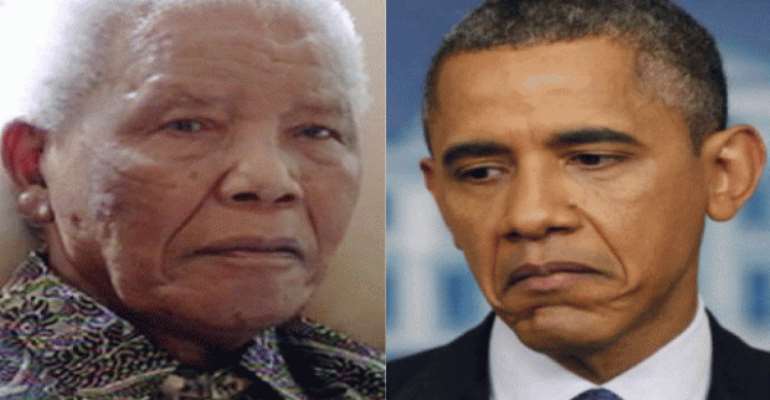Obama Visits Mandela's Family

The US leader, who spoke in Pretoria yesterday after talks with President Jacob Zuma, insisted that he did not intend to visit the 94-year-old ailing Mandela but met with the elder statesman's family in private where he discussed on telephone with his wife, Graca Machel.
His visit to South Africa was trailed by protests as riot police clashed with the anti-Obama demonstrators in Soweto.
Obama was in Soweto to deliver a speech to young African leaders at the University of Johannesburg.
According agency reports, President Zuma said Mandela remains 'stable but critical', adding that he had 'every hope that he will be out of hospital soon'.
Meanwhile, South Africa's last apartheid president who was jointly awarded the 1993 Nobel Peace Prize with Mr Mandela, FW de Klerk, plans to cut short his visit to Europe due to Mr Mandela's poor health, his foundation said in a statement.
In Pretoria, Mr Obama said Mr Mandela's example of 'the power of principle, of people standing up for what's right continues to shine as a beacon'.
'The outpouring of love that we've seen in recent days shows that the triumph of Nelson Mandela and his nation speaks to something very deep in the human spirit: the yearning for justice and dignity that transcends boundaries of race and class and faith and country,' he added.
He met members of the former leader's family at the Nelson Mandela Foundation in Johannesburg. The US first lady, Michelle Obama, did not accompany him but spoke to Mrs Machel by phone along with her husband.
Mrs Machel, who remains by Mr Mandela's side in the hospital in Pretoria, said after their phone call that she had conveyed their 'messages of strength and inspiration' to her husband.
Mr Zuma said that as the first black leaders of their respective countries, Mr Obama and Mr Mandela were 'bound by history' and so 'carry the dreams of millions of people in Africa and in the diaspora who were previously oppressed'.
When asked whether the US felt threatened by the increasing influence of other countries, particularly China, in Africa, Mr Obama replied that he believed it was a good thing for the development of the continent, but cautioned South Africa to ensure that foreign companies were employing local workers and investing back into the country.
Addressing students at the university, Mr Obama said he wanted to spread his 'yes we can' message to the continent's future leaders.
He urged them to take inspiration from Mr Mandela, who persevered through a long prison sentence.
'Think about 27 years in prison,' he said. 'Think about hardships and the struggles and being away from family and friends. There were dark moments that tested his faith in humanity, but he refused to give up. In your lives there will be times to test your faith.'
Just before he spoke, police fired rubber bullets and stun grenades to disperse protesters against his foreign policy who had gathered outside the university. At least one person was injured and one arrested.
Some protesters were carrying portraits of Mr Obama marked with a Hitler-style moustache.
'People died in Libya, people are still dying in Syria… in Afghanistan, in Pakistan, drones are still killing people. So that's why we are calling him a Hitler. He's a killer,'' Ramasimong Tsokolibane, 54, was quoted as saying by the Associated Press (AP).
